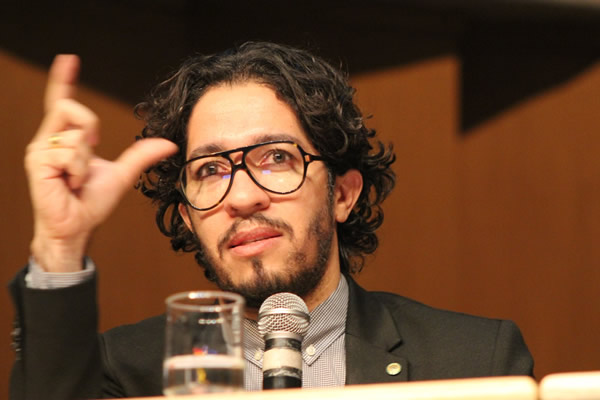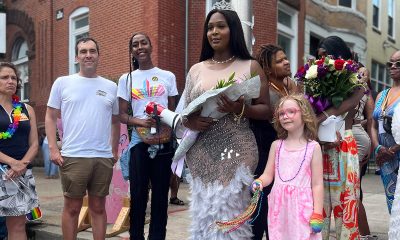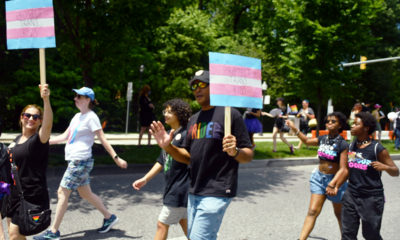News
Report documents anti-trans violence, bias in Brazil
Gay congressman said problem has ‘long history’ in country
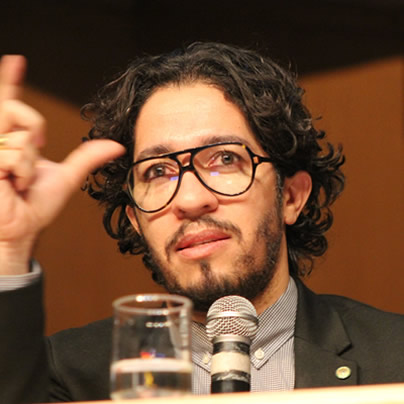
A D.C.-based international human rights organization earlier this month released a report that documents violence and discrimination against transgender Brazilians of African descent.
The Global Rights report includes statistics from the Brazilian Secretariat of Human Rights that indicate trans Brazilians accounted for slightly more than half of the 300 reported LGBT murder victims in the country last year. The group noted an estimated 52 percent of them were people of color.
Grupo Gay da Bahia, a Brazilian advocacy group that has tracked anti-LGBT violence in Brazil for nearly two decades, said it saw a 21 percent increase in LGBT murders in the country between 2011 and 2012. The organization reported 128 of the 338 reported LGBT homicide victims in Brazil in 2012 were trans.
Grupo Gay da Bahia further noted 250 LGBT Brazilians have been killed so far this year. The Inter-American Commission on Human Rights reported 20 trans people were murdered in Brazil in August and September.
The Global Rights report also cites additional statistics that show the homicide rate among Brazilians of African descent rose 5.6 percent between 2002 and 2010, compared to the 24.8 percent decline in these crimes among white Brazilians during the same period.
The Global Rights report also documents pervasive discrimination against trans Brazilians of African descent in law enforcement and employment and in the country’s education and health care systems because of their gender identity and expression and race.
The organization says Brazilian police frequently force trans women of color to strip naked in public and use racial, transphobic and homophobic slurs against them. The Global Rights report also documents cases where authorities transport trans suspects and detainees in the trunks of police cars and other confined spaces.
It also cites a researcher who documents anti-trans discrimination in Brazil that concluded an estimated 90 percent of trans women in the country are functionally illiterate due to discrimination they experienced in the Brazilian education system. A 2012 study from the Latin American School of Social Sciences, which is an inter-governmental initiative that UNESCO founded in the late 1950s, found roughly 51 percent of Brazilians of African descent are functionally illiterate.
“With a reality marked by multiple forms of discrimination, the LGBT community in Brazil has struggled to ensure that the human rights to life and public policies reach these groups,” Naiara Leite of the Odara Black Woman’s Institute in the city of Salvador said during a hearing on violence against trans Brazilians of African descent that the Inter-American Commission of Human Rights held in D.C. on Oct. 29. “Over the last few years, the Brazilian LGBT rights movement has been greatly concerned with the excessive increase of murders and violence against gays, lesbians, bisexuals and most importantly with the increase in violence against trans people.”
Brazil is among the 15 countries in which same-sex couples can legally marry.
Then-President Fernando Henrique Cardoso in 1997 created what became known as the Secretariat for Human Rights. Brazil in 2003 became the first country in the world to establish a government ministry specifically charged with promoting racial equality.
Brazilian Congressman Marco Feliciano in March became president of the Commission for Human Rights and Minorities in the lower house of Brazil’s Congress amid controversy over anti-gay and racist statements he posted to his Twitter account. Gay Congressman Jean Wyllys and other commission members resigned in protest of Feliciano’s election and formed a separate human rights caucus that lacks legislative authority.
The Commission for Human Rights and Minorities last week approved a measure that would suspend the National Council of Justice ruling in May that opened the door to same-sex marriage in South America’s largest country. Commissioners also backed a proposal that seeks to hold a national referendum on gay nuptials and rejected a bill that would have extended tax and legal benefits to same-sex couples and their dependents.
“If there is a country in the world that has made efforts in combating racial discrimination it is Brazil,” Carlos Quesada of Global First said during the Inter-American Commission on Human Rights hearing. “In spite of these efforts to promote human rights, the reality in the country is different.”
João Guilherme Maranhão of the Brazilian Ministry of Foreign Relations defended his country’s LGBT rights record during the hearing.
He noted Brazil and Uruguay were the first countries to introduce an LGBT rights resolution to the United Nations in 2007.
The Organization of American States during its 2008 general assembly adopted an anti-LGBT violence resolution that Brazil introduced. Maranhão noted to the commission it has subsequently been renewed and expanded.
“The situation of violence faced by transsexuals and transvestites in Brazil is an issue that merits the state’s attention,” he said.
Wyllys, who represents the state of Rio de Janeiro in the Brazilian Congress, told the Washington Blade earlier this month that discrimination against trans people of African descent has “a long history in Brazil.”
“The trans population is less educated and the most vulnerable to experience sexual and police violence,” he told the Blade during an interview from Brasilia, the country’s capital.
Wyllys added he feels President Dilma Rousseff has responded “shamefully” to the problem.
The Global Rights report specifically calls upon Rousseff to condemn “all incidents of discrimination, violence and human rights violations” against trans and other LGBT Brazilians of African descent. It also calls upon her government to develop a comprehensive plan to address the aforementioned issues.
The organization also urges Brazilian lawmakers to ban anti-LGBT discrimination and violence.
“We need more political and public discourse to increase understanding,” he said.
Politics
HRC slams White House over position opposing gender affirming surgeries for minors
‘Biden administration is flat wrong on this’
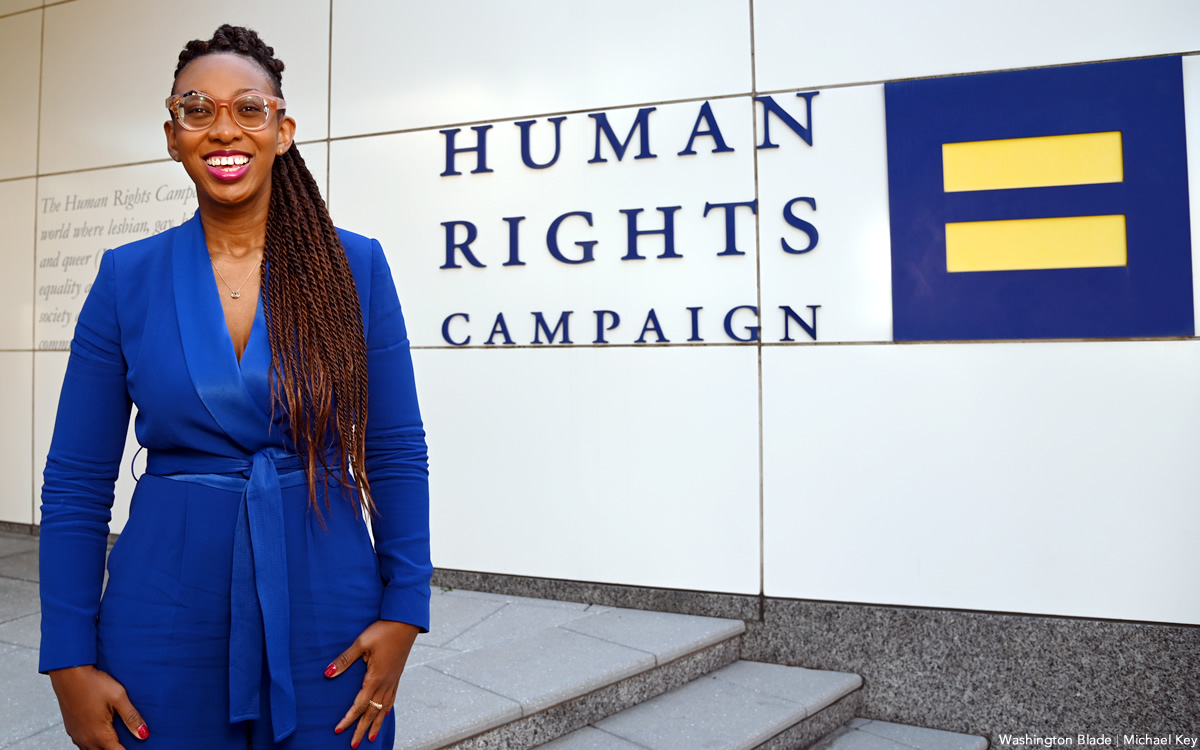
Human Rights Campaign President Kelley Robinson issued a strong rebuke on Tuesday of the Biden-Harris administration’s position opposing gender affirming surgeries for minors.
The New York Times reported on June 28 that the White House, which broadly supports making medical interventions available for transgender youth, had expressed opposition to surgeries for patients under 18, having previously declined to take a specific position on the question.
“Health care decisions for young people belong between a patient, their family, and their health care provider. Trans youth are no exception,” Robinson responded.
“The Biden administration is flat wrong on this. It’s wrong on the science and wrong on the substance. It’s also inconsistent with other steps the administration has taken to support transgender youth. The Biden administration, and every elected official, need to leave these decisions to families, doctors and patients—where they belong,” she added. “Although transgender young people make up an extremely small percentage of youth in this country, the care they receive is based on decades of clinical research and is backed by every major medical association in the U.S. representing over 1.3 million doctors.”
Robinson said the “administration has committed to fight any ban on healthcare for transgender youth and must continue this without hesitation—the entire community is watching.”
“No parent should ever be put in the position where they and their doctor agree on one course of action, supported by the overwhelming majority of medical experts, but the government forbids it,” she added.
HRC is a prominent backer of Biden’s 2024 reelection campaign, having pledged $15 million to support efforts in six battleground states. The organization has a strong relationship with the White House, with the president and first lady headlining last year’s National Dinner.
A White House spokesperson declined to respond to Robinson’s statement.
Campaign for Southern Equality President Allison Scott also issued a statement.
“This is a cowardly statement from an administration that promised to support transgender people. It is a troubling concession to the right-wing assault on transgender Americans, falling for their false narratives about surgical care and betraying a commitment to equality and trust in the medical community,” said Scott.
“Let’s be very, very clear: Government has no business inserting itself into private medical decisions that should be exclusively between patients, their providers, and the patients’ parent or guardian,” Scott added.
“It is dangerous to begin endorsing categorical bans or limits on healthcare, and there is no justification for restricting transgender youth’s access to the very same care that many cisgender youth receive every year — that’s literally the definition of discrimination,” Scott concluded. “We demand the Biden administration retract this thoughtless statement and work to undo its damage.”
Virginia
Parades, community events held to mark Pride Month in Va.
Upwards of 30,000 people attended PrideFest in Norfolk on June 22

Activists across Virginia last month held a series of events to mark Pride Month.
Hampton Roads Pride, a volunteer-run organization founded in 1997, held 37 different Pride events throughout the region in June.
Their biggest event, PrideFest, which is part of their larger three day event, Pride Weekend, celebrated its 36th anniversary on June 22. Pride Weekend took place from June 21-23 and began with a block party at NorVa in Norfolk.
PrideFest took place at Town Point Park, and an estimated 30,000 people attended. More than 70 venders participated, while Todrick Hall and Mariah Counts are among those who performed.
Another PrideFest event with a DJ in the afternoon and live music at night took place in Virginia Beach on June 23. Congressman Bobby Scott and U.S. Sen. Tim Kaine (D-Va.) are among those who attended Pride events in Suffolk on June 30.
Norfolk Mayor Kenneth Alexander, along with members of the Norfolk and Virginia Beach City Councils, also attended the Pride events in their respective cities. Jamar Walker, the first openly gay federal judge in Virginia, also took part.
“You know people all throughout Pride Month, at all of our various events, tell me all kinds of stories about their own experiences and the past of this community … and some of our older folks especially, remember when we couldn’t have this,” Hampton Roads Pride President Jeff Ryder told the Washington Blade on Monday during a telephone interview.
“It was a great year,” he added. “It was a big achievement for us to have unique celebrations in each of our seven communities. Each of these cities is so different from one another, but to be able to create a Pride celebration that’s unique in each of those places was really great, and I think really well received by folks who may not have felt represented previously. We’re always trying to do better, to embrace every aspect of our community, and take a big step forward there this year.”
State Dels. Adele McClure (D-Arlington County) and Alfonso Lopez (D-Arlington County) are among those who spoke at Arlington Pride that took place at Long Bridge Park on June 29. The Fredericksburg Pride march and festival took place the same day at Riverfront Park in Fredericksburg.
Republican Virginia Gov. Glenn Youngkin on June 10 hosted a Pride Month reception in Richmond.
Youngkin in previous years has hosted Pride Month receptions, even though Equality Virginia and other advocacy groups have criticized him for supporting anti-LGBTQ bills.
The Republican governor in March signed a bill that codified marriage equality in Virginia. Youngkin last month vetoed a measure that would have expanded the definition of bullying in the state.
U.S. Supreme Court
Concern over marriage equality in US grows two decades after first Mass. same-sex weddings
Gay and lesbian couples began to marry in Bay State in 2004

Two decades after Massachusetts became the first state to legalize same-sex marriage, a new study reveals both significant progress and ongoing challenges for married LGBTQ couples in the U.S., with a growing sense of insecurity about the future of their rights.
The Williams Institute at UCLA School of Law surveyed 484 married same-sex couples from all 50 states and D.C. The study, released Monday, marks the 20th anniversary of legal same-sex marriage in the U.S.
Researchers found that 93 percent of respondents cited love as a primary reason for marrying, with 75 percent also mentioning legal protections. Over 83 percent reported positive changes in their sense of security, and 74.6 percent noted improved life satisfaction since marrying.
However, the study also highlighted persistent discrimination and growing concerns about the future. About 11 percent of couples who had a wedding reported facing prejudice during the planning process.
Alarmingly, nearly 80 percent of respondents expressed concern about the potential overturning of the 2015 Obergefell v. Hodges decision, which legalized same-sex marriage nationwide. This anxiety has been exacerbated by initiatives like Project 2025, a conservative policy blueprint that some fear could roll back LGBTQ rights if implemented.
The possibility of a former President Donald Trump victory in the upcoming election has further intensified these concerns. Many respondents cited Trump’s previous U.S. Supreme Court appointments and his statements on LGBTQ issues as reasons for their apprehension. One participant stated, “The thought of another Trump presidency keeps me up at night. We’ve come so far, but it feels like our rights could be stripped away at any moment.”
The current political climate has 29 percent of respondents considering moving to another state, with 52.9 percent citing socio-political concerns as a primary reason. This reflects a growing sense of insecurity among LGBTQ couples about their rights and freedoms.
Brad Sears, founding executive director of the Williams Institute, noted, “The data clearly show that marriage equality has had a profound positive impact on same-sex couples and their families. However, it also reveals ongoing challenges and serious concerns about the future of these rights in light of current political trends and the upcoming election.”
Christy Mallory, legal director at the Williams Institute and lead author of the study, added, “This research provides crucial insights into the lived experiences of same-sex couples two decades after marriage equality began in the U.S. The high level of concern about potential loss of rights underscores the continued importance of legal protections and public support for LGBTQ+ equality.”
The study found that 30 percent of surveyed couples have children, with 58.1 percent of those parents reporting that marriage provided more stability for their families. However, many of these families now worry about the security of their legal status in the face of potential policy changes and shifting political landscapes.
As the nation reflects on two decades of marriage equality, the study underscores both the transformative power of legal recognition and the ongoing need for vigilance in protecting LGBTQ+ rights. The findings highlight the complex reality faced by same-sex couples in America today: Celebrating hard-won progress while grappling with uncertainty about the future, particularly in light of upcoming political events and potential shifts in leadership.
-

 Canada1 day ago
Canada1 day agoToronto Pride parade cancelled after pro-Palestinian protesters disrupt it
-

 Theater5 days ago
Theater5 days agoStephen Mark Lukas makes sublime turn in ‘Funny Girl’
-

 Baltimore3 days ago
Baltimore3 days agoDespite record crowds, Baltimore Pride’s LGBTQ critics say organizers dropped the ball
-

 Sports4 days ago
Sports4 days agoHaters troll official Olympics Instagram for celebrating gay athlete and boyfriend

